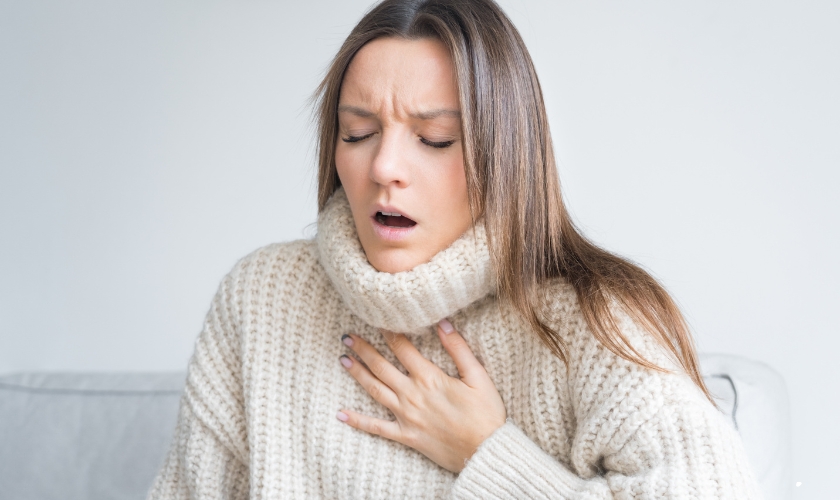What Causes Shortness Of Breath And Rapid Breathing?

Shortness of breath and rapid breathing are symptoms that can be alarming and uncomfortable, leading many people to seek immediate relief or medical advice. These symptoms, also known as dyspnea and tachypnea, respectively, can be caused by a wide range of factors, from physical health conditions to psychological issues.
In this article, we’ll explore the various causes of shortness of breath and rapid breathing, focusing on both physical and psychological triggers, including the role of anxiety. We’ll also discuss how anxiety treatment in Round Rock can help those experiencing these symptoms due to mental health concerns.
Physical Causes of Shortness of Breath and Rapid Breathing
Several physical health conditions can lead to shortness of breath and rapid breathing. These conditions often require prompt medical attention to prevent complications.
Respiratory Conditions
- Asthma: This chronic condition produces airway inflammation and constriction, which results in wheezing, dyspnea, and rapid breathing.
- Chronic Obstructive Pulmonary Disease (COPD): a developing illness that makes it difficult to breathe, often resulting in dyspnea and tachypnea.
- Pneumonia: A lung infection that may result in shortness of breath, rapid breathing, and other severe symptoms like fever and cough.
- Pulmonary Embolism: A thrombus in the lungs that can suddenly cause difficulty breathing and rapid heart rate.
Cardiac Conditions
- Heart Failure: Breathlessness can occur when the heart is unable to pump blood efficiently, causing fluid to accumulate in the lungs. This is most common when lying down or exercising.
- Arrhythmias: The heart may beat irregularly, leading to symptoms like palpitations, shortness of breath, and rapid breathing.
- Coronary Artery Disease: Narrowing or blockage of the coronary arteries may decrease the heart’s blood flow, resulting in breathlessness, chest discomfort, and rapid breathing.
Other Physical Causes
- Anemia: A deficiency in red blood cells may result in the body receiving insufficient oxygen, which causes shortness of breath and fatigue.
- Obesity: Excess body weight can strain the lungs and heart, leading to breathing difficulties, particularly during exertion.
- Infections: Severe infections like sepsis can cause the body to demand more oxygen, resulting in rapid breathing and shortness of breath.
- Allergic Reactions: A serious allergic reaction known as anaphylaxis can result in the airway’s swelling and lead to shortness of breath and rapid breathing.
Psychological Causes: Anxiety and Panic Attacks
While physical conditions are a common cause of shortness of breath and rapid breathing, psychological factors, particularly anxiety and panic disorders, can also be significant contributors.
Anxiety Disorders
- Generalized Anxiety Disorder (GAD): Individuals with GAD may experience chronic worry and tension, which can manifest as physical symptoms, including shortness of breath and rapid breathing.
- Panic Disorder: Panic attacks are sporadic, severe moments of dread or discomfort that can trigger rapid breathing, chest pain, dizziness, and a feeling of suffocation.
- Social Anxiety: Situations that trigger social anxiety, such as public speaking or crowded spaces, can lead to hyperventilation and shortness of breath.
- Post-Traumatic Stress Disorder (PTSD): Individuals with PTSD may experience flashbacks or anxiety that lead to hyperarousal, including rapid breathing and shortness of breath.
Hyperventilation Syndrome
- Hyperventilation occurs when you breathe faster than necessary, causing the levels of carbon dioxide to decrease in the blood. This can result in dizziness, lightheadedness, and shortness of breath.
- Anxiety is a common trigger for hyperventilation, and in certain instances, people could establish a pattern of hyperventilating whenever they feel anxious.
How Does Anxiety Treatment Can Help?
- Managing anxiety effectively can significantly reduce the occurrence of shortness of breath and rapid breathing caused by anxiety or panic attacks. Anxiety treatment in Round Rock offers a range of therapeutic approaches, including cognitive-behavioral therapy (CBT), mindfulness techniques, and relaxation exercises.
- These treatments help individuals recognize and manage anxiety triggers, develop coping mechanisms, and prevent the physical signs of anxiousness, such as breathing difficulties and rapid breathing.
Situational Causes: Temporary Triggers
In some cases, shortness of breath and rapid breathing may be triggered by temporary or situational factors that are not related to an underlying medical or psychological condition.
Physical Exertion
- Excessive exercise, particularly if you are not used to it, can cause shortness of breath and fast breathing because it forces your body to utilize more oxygen.
High Altitude
- Being at high altitudes, where the air has lower oxygen levels, can lead to shortness of breath and rapid breathing until your body acclimates.
Extreme Temperatures
- Very hot or cold weather can make breathing more difficult, leading to shortness of breath and rapid breathing, particularly in individuals with pre-existing respiratory conditions.
Intense Emotions
- The body’s fight-or-flight reaction can be triggered by strong emotions like fear, excitement, or rage, which can cause symptoms including shortness of breath and fast breathing.
Ultimately, Shortness of breath and rapid breathing are symptoms with a wide range of potential causes, from physical health conditions like asthma and heart disease to psychological factors such as anxiety and panic disorders. Comprehending the fundamental reason is crucial for efficacious therapy and management.
For individuals experiencing these symptoms due to anxiety, anxiety treatment in Round Rock offers valuable support and strategies to manage and reduce the occurrence of shortness of breath and rapid breathing. Gaining control over your breathing and raising your general quality of life can be achieved by treating the underlying reasons for anxiety and learning coping techniques.
If you frequently experience shortness of breath or rapid breathing, it’s important to consult a healthcare professional to determine the cause and receive appropriate treatment. Whether the issue is physical, psychological, or situational, early intervention can help prevent complications and provide relief from these distressing symptoms.
